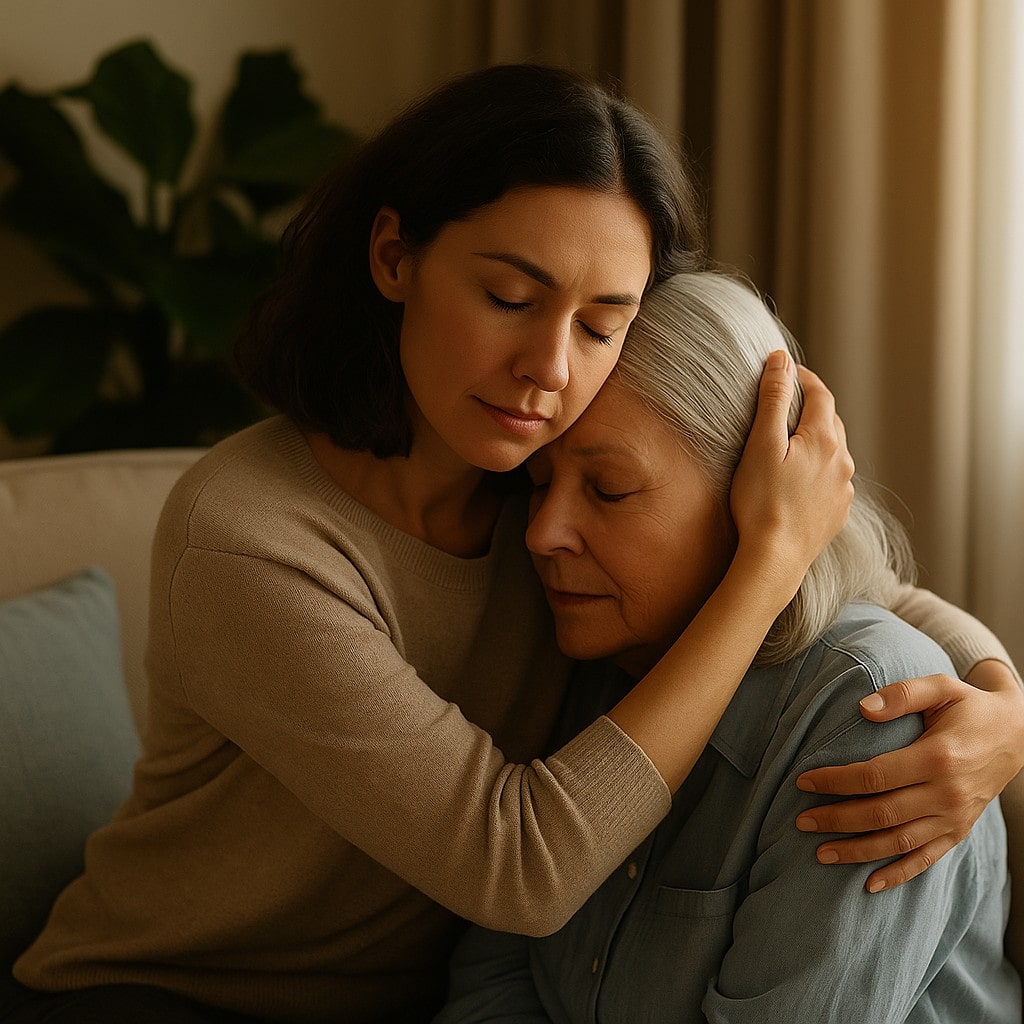 Caregiver Stress: How did I become a caregiver?
Caregiver Stress: How did I become a caregiver?
Some roles in life come with clear instructions. Others, like caregiving, often arrive gradually—quietly, unexpectedly, and without a manual. One day, you’re helping your aging parent with a few errands. A few months later, you’re managing medications, coordinating doctor visits, and becoming the emotional anchor for the entire family. The stress builds slowly, and before you realize it, you’re stretched thin in every direction.
As a licensed therapist who works closely with caregivers, I’ve seen how the weight of this role can quietly chip away at even the most resilient individuals. This article is for those navigating the complex emotions and relentless responsibilities of caring for aging parents or others in need of your support. If you’re feeling overwhelmed, exhausted, or like you’ve lost yourself in the process, know that you’re not alone—and there is support available if you are experiencing caregiver stress.
What Is Caregiver Stress?
Caregiver stress refers to the physical, emotional, and mental strain that results from providing long-term care and support for a loved one. It can build gradually, especially in situations where the demands of caregiving increase over time without a corresponding increase in support.
You might feel like you’re constantly on edge, juggling responsibilities without any space to rest. You might also notice physical symptoms like fatigue, frequent headaches, or disrupted sleep. Emotionally, caregiver stress can show up as irritability, anxiety, or a sense of helplessness. Mentally, it may be difficult to concentrate or make decisions, especially when you’re tired or emotionally drained.
One of the most challenging aspects of caregiver stress is that it often goes unrecognized. Our culture tends to see caregiving—especially for parents—as a noble duty. While it certainly can be meaningful, that expectation can also make it hard for caregivers to admit they’re struggling or to ask for help without guilt.
Emotional Burdens Caregivers Carry
Caregiving is more than a to-do list. It’s an emotional journey, and often a lonely one. Many caregivers describe a tangle of emotions that seem to contradict each other, all layered over a persistent sense of guilt.
- Guilt over not doing enough: Even when you’re doing everything you can, you may feel that it’s not enough. You may wonder if you’re missing something important or feel bad for resenting the time it takes away from your own life.
- Fear of loss: Beneath the daily tasks often lies a deep fear—fear of losing your parent, of witnessing their decline, or of being unprepared when the time comes. This anticipatory grief is emotionally exhausting and a major contributor to caregiver stress.
- Frustration and resentment: If siblings or other family members aren’t helping—or worse, are critical from the sidelines—it’s natural to feel angry. You might resent the unequal division of labor or the lack of appreciation.
- Shame about your own emotions: Many caregivers feel ashamed when they experience frustration or wish for a break. They believe these feelings mean they’re not a good person or caregiver, which only adds to the caregiver stress.
- Role reversal: Watching a parent become dependent can feel deeply disorienting. The person who once guided and supported you now needs your help, and that reversal can bring sadness, confusion, or even resistance.
Signs You May Be Experiencing Caregiver Burnout
Burnout is more than fatigue—it’s a state of physical, emotional, and mental exhaustion caused by prolonged stress. Many caregivers push through their days on autopilot without realizing just how depleted they are.
Here are some signs that caregiver stress may be escalating into burnout:
- Persistent exhaustion, even after sleeping
- Frequent irritability or outbursts of anger over small things
- Feeling emotionally numb or disconnected from others
- Neglecting your own health, skipping meals or doctor appointments
- Losing interest in activities you used to enjoy
- Increased reliance on caffeine, alcohol, or other substances to cope
- A sense of hopelessness, feeling like nothing you do makes a difference
- Recognizing these signs isn’t a reason for shame—it’s a signal that you need care, too.
Practical Tips to Ease Caregiver Stress
Reducing caregiver stress starts with reclaiming small pockets of control, setting boundaries, and learning how to ask for help without guilt.
- Set small, clear boundaries: You don’t need to be available 24/7. Consider designating “off hours” each evening or scheduling personal time every week. Communicate these boundaries kindly but firmly with family members.
- Accept help, even when it’s imperfect: Many caregivers struggle with the idea that no one else can do it “right.” But perfection isn’t necessary—what matters is support. Let someone else do the grocery run, even if they buy the wrong brand.
- Create checklists and routines: Organizing tasks helps ease mental overload. Write down recurring responsibilities, medications, and appointments. This frees up mental space and reduces the fear of forgetting something important.
- Prioritize basic self-care: You don’t need elaborate rituals—just start with the essentials. Eat regularly, stay hydrated, and aim for consistent sleep. These small habits form the foundation of resilience.
- Practice ‘micro-rest’ moments: Even five minutes of quiet breathing, stepping outside, or listening to a favorite song can restore calm during a hectic day.
The Power of Sharing Your Story
Caregiving can feel incredibly isolating, especially when others don’t fully understand the complexity of what you’re going through. Talking about your experience—not just the logistics, but the emotional weight—can be profoundly healing.
- Peer support groups: Whether in-person or virtual, these spaces allow caregivers to connect with others who “get it.” Simply hearing someone say, “Me too,” can ease the sense of isolation.
- Journaling: Writing down your thoughts helps release emotions that don’t have another outlet. You might begin with prompts like, “Today I felt…” or “What I wish people understood about my life right now is…”
- Being honest with family: If you’re doing the majority of the caregiving, speak up. Let others know what you need—whether it’s respite, help with bills, or just acknowledgment.
Your story matters. Telling it is a form of self-validation and, often, the first step toward healing.
When to Consider Counseling
Sometimes, the emotional strain of caregiving becomes more than one person can manage alone. Therapy isn’t a sign of weakness—it’s a tool for resilience.
You might consider therapy if:
- You feel hopeless or overwhelmed most days
- Resentment toward your loved one is growing
- You no longer recognize yourself outside the caregiving role
- Anxiety, depression, or chronic stress are interfering with daily functioning
Therapy provides a safe space to process grief, anger, fear, and guilt. A skilled therapist can help you:
- Explore the roots of your patterns (e.g., perfectionism, over-functioning)
- Set realistic boundaries that protect your wellbeing
- Process complicated family dynamics (such as long-standing resentments or unresolved childhood wounds)
- Develop emotional regulation tools for moments of panic, sadness, or frustration
- Rediscover your identity apart from caregiving
- Therapy also helps when anticipatory grief sets in. Caring for a declining parent often brings sadness long before a formal goodbye. Naming that grief and exploring it can lessen the emotional toll.
You Deserve Care Too
We often hear “you can’t pour from an empty cup,” but for caregivers, the cup is often cracked before anyone notices. And still, you pour.
You don’t have to earn rest. You don’t have to justify needing support. You matter, even when you’re not fixing things.
- Reframe the guilt: Prioritizing yourself doesn’t mean you care less—it means you’re protecting your capacity to care well.
- Find tiny joys: A warm beverage, a phone call with a friend, or even watching your favorite show—these are small lifelines.
- Connect with others: You don’t have to carry this alone. Community, whether through therapy, support groups, or honest conversations, lightens the load.
Being a caregiver is an act of love—but loving yourself in the process is just as important. If you’re struggling, you don’t have to white-knuckle through it. Support is available, and it can change everything.
Meet the Therapist

Jody Morgan, LCSW, CCTP is the founder of the Morgan Center for Counseling and Wellbeing in Boca Raton. He is a compassionate counselor dedicated to helping individuals grow and heal. With extensive training and certifications, Jody specializes in trauma-focused treatments, including focusing on related anxiety, depression, and grief. He works with clients who want to learn how to manage anxiety and grief.
- Licensed Clinical Social Worker (LCSW)
- Certified Clinical Trauma Professional
- EMDR Certified
- Advanced Certificate in Heart-Centered Clinical Hypnotherapy
- Certificate in Inetrgral Breath Therapy (Integration Concepts)
At Morgan Center, Jody Morgan provides private psychotherapy services that lead to lasting relief. His experience and evidence-based techniques help clients overcome the effects of grief, trauma, anxiety and to achieve meaningful change. He has helped countless clients learn to manage anxiety, depression, and to deal with caregiver stress. Our treatment services are tailored to meet the specific needs of individuals affected by these issues, offering emotional support and guidance.
Find Us On: Facebook | X | BlueSky



 Caregiver Stress: How did I become a caregiver?
Caregiver Stress: How did I become a caregiver?